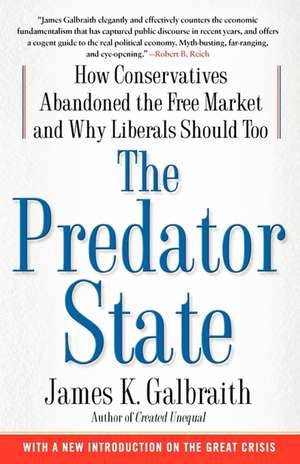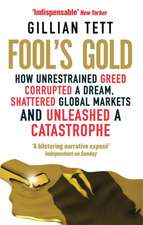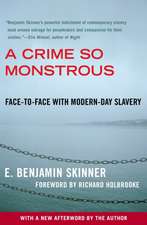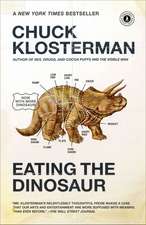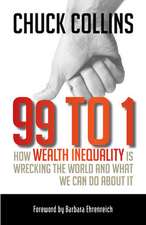The Predator State: How Conservatives Abandoned the Free Market and Why Liberals Should Too
Autor James K. Galbraithen Limba Engleză Paperback – 20 iul 2009
In plain English, the Republican Party has been hijacked by political leaders who long since stopped caring if reality conformed to their message. Galbraith exposes the crumbling pillars one by one, naming names and pulling no punches.
Preț: 89.50 lei
Nou
Puncte Express: 134
Preț estimativ în valută:
17.14€ • 17.49$ • 14.42£
17.14€ • 17.49$ • 14.42£
Carte disponibilă
Livrare economică 04-18 februarie
Preluare comenzi: 021 569.72.76
Specificații
ISBN-13: 9781416576211
ISBN-10: 1416576215
Pagini: 240
Ilustrații: index
Dimensiuni: 140 x 216 x 20 mm
Greutate: 0.2 kg
Editura: Free Press
Colecția Free Press
Locul publicării:United States
ISBN-10: 1416576215
Pagini: 240
Ilustrații: index
Dimensiuni: 140 x 216 x 20 mm
Greutate: 0.2 kg
Editura: Free Press
Colecția Free Press
Locul publicării:United States
Notă biografică
James K. Galbraith holds the Lloyd M. Bentsen Jr. Chair in Government/Business Relations at the Lyndon B. Johnson School of Public Affairs at the University of Texas at Austin. He lives in Austin, Texas. The End of Normal is his first book.
Extras
The Predator State
Does anyone else recall the days when to be an economic conservative in the United States meant something? As a young liberal on the congressional staff a long time ago, I remember them in vivid frustration. The 1970s saw the rise of two distinct conservative movements, the supply-siders and the monetarists: radical tax cutters and deregulators on one side, apostles of strict control over the money stock on the other. Their rise culminated in the Reagan revolution of 1980, which brought them both into high office. This was personal: the conservative alliance devalued my Keynesian education, obstructed my career, and deprived me and my few comrades on Capitol Hill of purchase on the levers of power. It was difficult politically. As executive director of the Joint Economic Committee in 1981, I organized a largely futile frontline resistance. But intellectually it was even worse. However much one disagreed with them, these were people who believed. They were idealists. They had the force of conviction. Worse still, they were setting the agenda. And there was the thought: Suppose they were right?
The Reaganites offered up a famous combination of policies that had grown largely from seeds planted in the academy during the long years of liberal rule. The central element was reduction of taxes on wealth, intended to unlock the productive powers of capital, spurring saving and investment. Tight money was intended to end inflation quickly, brutally if necessary. And with this came a wide-ranging assault on government, regulation, and unions, whose purpose was to let market forces—and private capitalists—rule.
Except among the immediate victims, the great conservative ideas for a time had wide appeal. Some of it was scientific. For each problem, they offered a solution. Each solution was rooted in the attractive vision of free individual economic choice, coordinated only by the marketplace and the gentle persuasions of price. The solutions had scholarly credentials; they were rooted in the economics my generation had imbibed in graduate school. For that reason, President Reagan was able to draw on some of the most prominent economists in the country, not all of them ideologues by any means. Murray Weidenbaum and Martin Feldstein were his first chairs of the Council of Economic Advisers, and even young tyros Lawrence Summers and Paul Krugman, who each came in for a year under Feldstein, would serve in his administration. Nobody of remotely comparable talent would work under George W. Bush.
In addition to intellectual legitimacy, the popularity of the conservative viewpoint in those days had an emotional, even a romantic, aspect. The conservatives promised prosperity without the trouble of planning for it, achieved through a simple three-step program: cut taxes, end inflation, and free the market. At a deeper level, they promised an end to a kind of politics that many in elite circles—frankly in both major parties—had come to loathe: the politics of compromise, redistribution, and catering to the needs and demands of minorities and the poor. America in 1980 had compassion fatigue. The conservative agenda promised, perhaps more than anything else, to make compassion redundant. In addition, it was audacious, radical, flashy—a program with sex appeal. Suddenly it was the conservatives who were the brave and brash bad boys of American culture, while liberals like myself had become the country’s killjoys, young fogies hopelessly in the grip of old ideas.
What is left of all this, twenty-five years on? Essentially nothing. The election of November 7, 2006, swept conservative Republicans from their majorities in both houses of Congress and signaled a new skepticism about entrusting government to those who profess to despise it. Plainly the public no longer believes what conservative leaders say about free markets. The death of Milton Friedman ten days later symbolized the era’s end. Yet as the Wall Street Journal’s own Friedman obituary conceded, policymakers had long previously discarded the practical substance of his ideas.* Central banks do not attempt to control the money supply. Regulation has been reinstated in finance, and the facts of climate change make a new era of environmental interventions inevitable, sooner or later. Meanwhile, the world has given up waiting for tax cuts to unleash the hidden creativity of the business class.
The issue today is not whether the great conservative ideas once had appeal or a foundation in reputable theory. The issue is whether they have a future. And on that point, there is general agreement today, largely shared even by those who still believe passionately in the conservative cause. The fact is that the Reagan era panoply of ideas has been abandoned as the intellectual basis of a political program. There are almost no monetarists left in power. There are no convinced supply-siders (though the catechism is still occasionally recited). There are no public intellectual leaders in any campaign for “free markets” and against regulation. “Free trade” has been reduced to a label, pasted over trade agreements that are anything but “free.” The economic conservative still reigns supreme in the academy and on the talk shows, but in the public realm, he is today practically null and void. He does not exist. And if he were to resurface today in the policy world, offering up the self-confident doctrines of 1980, he would be taken seriously by no one.
Today, in the great policy house of the conservatives, there are only lobbyists and the politicians who do their bidding. There are slogans and sloganeers. There are cronies and careerists. There are occasional fix-it men who are called in when major disasters have to be repaired. There are people who predict disaster, quite routinely, in order to justify the destruction of Social Security and other popular programs, for the transparent purpose of turning them over to friends on Wall Street. Mercifully few believe them, though that does not end the danger, for they represent forces whose power does not rest on persuasion. There are university economists who can be tapped, as ever, for high public office, but they plainly lack convictions. Once in office, they come and go, doing nothing to advance the conservative case. In public view, the conservative house stood for a long time, a mansion visible from all parts of the landscape. But inside, the place was decrepit; its intellectual foundation had collapsed. A few true believers continued to live there, but it was not any great surprise, even to them, when it fell down.
What are the Reagan conservatives doing today? Milton Friedman himself, the father of monetarism, in 2003 repudiated his own old policy doctrine: “The use of quantity of money as a target has not been a success…. I’m not sure I would as of today push it as hard as I once did,” he told the Financial Times.* In the face of the complete collapse of the evidence on which they had based their case linking money growth to price change, the other monetarists have mostly dropped the topic or passed on. Practically everyone today agrees: the Federal Reserve sets the short-term interest rate, and it is interest rates, not the money stock, that drive the economy. Indeed, the Federal Reserve recently quietly ceased to publish certain monetary statistics in which the academic world had lost interest (and no one else ever had any).
Jude Wanniski, the original supply-sider, died at age sixty-nine in late 2005. He never stopped being a supply-sider and, I think, a true believer. But from 2001 onward, he devoted himself to opposing, eloquently, the neoconservative wars; he and I became friends and even coauthored an article on one occasion. It was joint antimonetarist advice—from the “first supply-sider” and the “last Keynesian”—to the Federal Reserve against raising interest rates. George Gilder, who scourged the poor and celebrated wealth in the early 1980s, went on to become a guru of the technology revolution in the 1990s; when the tech boom collapsed, so did the market for his stock-picking skills. Paul Craig Roberts, assistant secretary of the treasury for economic policy in the Reagan administration, later author of The Supply-Side Revolution and a columnist for Business Week, has become a vehement voice against the Iraq war, the building threat of a war with Iran, and the assault on civil liberties that is part of the “global war on terror.” Bruce Bartlett, once an avid young supply-sider and author of Reaganomics, remains an old-fashioned advocate of the most forlorn cause in modern history: small government. In 2005 he published a book entitled Impostor: How George W. Bush Bankrupted America and Betrayed the Reagan Revolution.
Perhaps the greatest conservative true believer was the Old Objectivist himself, Alan Greenspan, for eighteen years chairman of the board of governors of the Federal Reserve System. Though never a monetarist, Greenspan assiduously favored tax cuts, spending cuts, and deregulation. In office he always deferred to the avatars of free markets, refusing to use his judgment or his soapbox or his regulatory power against speculative bubbles in technology and housing. His philosophy on these matters was that markets are like that and the job of government is to clean up the mess after the crash. Yet in his monumental recent confessions, The Age of Turbulence, Greenspan delivered his verdict on the Republicans of 2006: “They traded principle for power and ended up with neither. They deserved to lose.”*
It is fashionable today to dismiss the Reagan conservatives, including those I have mentioned, as swindlers, the mere tools of the monied interests who backed them. This is the approach taken, for instance, by New Republic senior editor Jonathan Chait in his new book, The Big Con, while Paul Krugman in his new book, Conscience of a Liberal, tends to treat them as either swindlers or fools. I have no objection to the political economy of those books; money does talk. But I do not think the verdict is entirely fair. The fact that money hires ideas is not necessarily a decisive argument against the ideas; it does not make the ideas illegitimate on their face. Nor is it correct to argue that the monetarists, the supply-siders, and the deregulators were fringe-end elements in academic circles. To the contrary, Milton Friedman’s followers entirely dominated discussions of monetary policy for a generation. Flat-taxers like Robert Hall and Alvin Rabushka were ensconced in top departments and think tanks; supply-sider Robert Mundell won the economists’ version of the Nobel Prize. The fact is, Reagan’s radicals had a deep academic bench, including a fair number who did not think his policies went nearly far enough. The disillusionment today of the remaining Reagan policy veterans with the Bush regime goes deeper than the fact that they are not on the payroll. It has to do, rather, with the collapse of their ideas as governing doctrine. Meanwhile, they are now shunned by the theorists in the academy, who would rather not leave fingerprints on the wreckage. But they rightly remember the day when the big professors were happy to be their friends.
There is a reason, in short, that principled conservatives find themselves in the political wilderness once again: they belong there. They are noble savages and the wilderness is their native element. They do not belong in government because, as a practical matter, they have little to contribute to it; they are guilty of taking the myths they helped to create too seriously, and to sophisticated people, that makes them look a bit foolish. They are against deficits, government spending, and the expansion of publicly financed health care coverage. Fine. What do they propose to do about them? They favor income tax cuts, and cuts in tax rates on all forms of wealth, but do they still argue, as a good conservative needs to believe, that such cuts would be self-financing, that savings, investment, and work effort will bloom? Of course they don’t, because the experiment was tried, and it failed. They still favor free markets in broad principle, but do they speak in detail of the fate of the airlines, the national forests, the coal miners, and the savings and loan industry under deregulation? No. We find that for the most part, these are topics that the latter-day divines of the free-market-in-principle would very much prefer to avoid.
Looking forward, one may ask how economic conservatives address our current problems. Do they have an alternative to our oil addiction, to imperial commitment, to global warming? No. Did they have a program of recovery for the city of New Orleans? No. Is there a realistic conservative plan for health care? No. There is merely opposition to everyone else’s ideas. Is there a realistic conservative approach to immigration? Not really. Part of the conservative movement favors a brutal and impossible wall, and part of it favors a return to indentured servitude in the form of a guest worker program. Have the conservatives come to grips with the changing global economy, notably the wave of economic crises since 1980 and the rise of the one large country to stay away from the globalized financial system, namely, China? Do they have a vision for the future of the world monetary system should something happen to confidence in the dollar? No. The terms of the policy dialogue have changed, but the terms of reference of the great conservative economic worldview have not.
It is therefore no surprise that George W. Bush failed to make principled use of principled conservatives, thereby earning their embittered rejection. The reality is that no government, no matter how far to the right in political terms, could make any serious use of them. The experience of the past quarter-century and the evolution of practical understanding about economic policy since the Reagan years simply makes it impossible to take the conservative worldview seriously as a constellation of ideas to be applied to policy. And therefore it is fair to say that there will never again be any U.S. government for which a truly principled conservative might work. In the final analysis, Bush is remarkable merely for his lack of interest in hiring committed intellectuals to shill for his policies, and therefore for his willingness to court rejection by the principled conservative crowd. He ran an unapologetic government of businessmen and lobbyists, governing largely without academic cover.
Moreover, not only have the conservatives been cast from power, they have also ceased to evolve. Is there any such thing as a modern conservative economic policy idea? Not only are there no Reaganite intellectuals in Bush’s government, the flow of new suggestions from the academic citadels into the policy arena has stopped. To find the main work of today’s leading academic conservatives requires reaching back thirty years. All of the ideas that define conservative economic thought in America (and in the rest of the world) were well known a generation ago. They were all tested, in the United States, the United Kingdom, and around the rest of the world, in the cauldron of the 1980s. And they were nearly all abandoned by policymakers long ago—by the end of the 1980s at the latest in the United States, by the early 1990s in Britain, and by the end of the 1990s in most of the rest of the world. Those that were enacted, like charter schools, are in the evaluation phase, and the record is not especially good. Those that remain on the agenda (or are likely to come again), like the privatization of Social Security, have no new justification. The arguments cooked up for that cause are at least twenty years old. Academic economics today is divided largely between a body of pragmatic work that is no longer very conservative (but, rather, apolitical) and a body of conservative doctrine that lacks any connection to the policy world.
These abandonments were not incidental defections, without which we would still live in the world of Reagan and Thatcher. They were experiments that failed. They were lessons learned, often the hard way. They were strategic retreats, sometimes under heavy fire. The reality is that the disciplined application of conservative principles to economic policy leads to disaster. This is particularly true of policies intended to manage or transform the economy as a whole.
Everywhere and always, monetarism leads to financial crisis. Supply-side tax cuts have no detectable effect on work effort, or savings, or investment. Financial deregulation, from the savings and loan debacle to the subprime mortgage fiasco, leads to criminal misdirection of the firm. Cuts in government spending are neither necessary nor sufficient for productivity gain. These are facts now well absorbed by practical policymakers, around whom the vestiges of past conservative verities hang in tatters. Only the dedicated academic economist can pretend to be unaware of them, and the conservative creed economics survives at all not because of a renewable wellspring of success stories, but only because it retains a powerful grip on the academy itself, on the ideas that scholars reproduce for the closed circle of their own journals. That grip will be difficult to dislodge because academics do not face elections. But it is no longer a very important fact for the policy world.
A similar fate has befallen the made-for-export version of the conservative creed, the so-called Washington Consensus of international development strategies, a set of universal precepts of sound money, balanced budgets, deregulation, privatization, and free trade. These too rose in the wake of the Reagan revolution and its international counterpart, the debt crisis of the Third World. They were forced on Latin America, East Europe, Africa, and parts of Asia on the promise that the “magic of the marketplace” would generate growth and prosperity in the wake of failed policies of protectionism, subsidies, and ineffective support for industrial development. It turned out that economic success in the Third World since 1980 has been in negative relation to the consensus. Those that adhered most closely to the Washington Consensus, like Argentina, suffered crisis and collapse, while those that followed their own paths, notably China, prospered. As this became clear, rebellion against the Washington Consensus has spread across Latin America, Africa, and much of Asia, where today the model is universally repudiated in principle and increasingly evaded in practice. In Argentina, once a poster child of neoliberal conformism, economic recovery followed the repudiation of debts both philosophical and financial. In despised places like Venezuela and Russia, high energy prices have fostered financial and philosophical independence, and the International Monetary Fund (IMF) is today in most of the world a spent force, with no remaining programs in Latin America at all, revenues insufficient to cover its spending, and large layoffs in the works. Even managing director Dominique Strauss-Kahn has admitted that the organization is “a factory to produce paper.”
These are the facts. But even though as facts they are widely recognized and acted on in practice, our political discourse has its own rituals and does not yet admit them. Indeed, few politicians in either party have yet publicly divorced themselves from the Reagan revolution, in particular from the idea of the free market. Politicians notoriously say what is convenient and act along different lines entirely, causing problems for those who try to write about their views in a careful and serious way. But perhaps on no other issue is this tendency more pronounced than in matters relating to the markets—a word one apparently cannot use in public in the United States without bending a knee and making the sign of the cross.
And here the political world is divided into two groups. There are those who praise the free market because to do so gives cover to themselves and their friends in raiding the public trough. These people call themselves “conservatives,” and one of the truly galling things for real conservatives is that they have both usurped the label and spoiled the reputation of the real thing. And there are those who praise the “free market” simply because they fear that, otherwise, they will be exposed as heretics, accused of being socialists, perhaps even driven from public life. This is the case of many liberals. Reflexive invocations of the power of markets, the “magic” of markets, and the virtues of a “free enterprise system” therefore remain staples of political speech on both sides of the political aisle. However, they have been emptied of practical content, and the speakers know it.
Yet this is not another book about the insincerity of the group of conservative impostors in power; that case has been sufficiently made, and I have already delivered my own views on George Bush, Dick Cheney, and Alan Greenspan in another book.* This book is mainly about the rise and fall of authentically conservative ideas, about the inadequacy of their central metaphor, the free market. My purpose is not to denigrate those who took up the conservative cause a generation ago; many have become my friends and I respect them. My plan here is to take the conservative project seriously, on the premise that it was offered in good faith. The principled conservatives were, in my view, naive; I obviously believe they were wrong, and they have been abandoned by history, but none of this proves that they were dishonest. And if some really were cranks and charlatans, they had plenty of company among the most respectable and prestigious academic economists in the land.
My aim, in this exercise, is to try to free up the liberal mind. For while the right wing in power has abandoned the deeper philosophical foundations of its cause, liberals remain largely mesmerized by those foundations. Outside the area of trade policy, where an enduring populism reflexively opposes “free trade” agreements, liberals have largely accepted the basic conservative principles: monetary control, balanced budgets, regulation only where it can be shown that “markets fail.” And until they break the spell, they will not be able to think or talk about the world in terms that relate effectively to its actual condition. Nor will they be able to advance a policy program that might actually work. And since liberals may well, at some point in the near future, seize the keys to the realm, what they think and (more important) how they think has come to matter, once again, as it has not really mattered for nearly half a century.
To take an example, Senator Hillary Rodham Clinton has, in the past, shown an admirable willingness to criticize the “free market.” According to the radically conservative journal Human Events, in 1996 she said on C-Span that “the unfettered free market has been the most radically destructive force in American life in the last generation.”* Yet in 2007 her presidential campaign program on the economy promises to “reward savings” and “balance the federal budget”—classic conservative themes. She calls for measures to “make health care affordable,” which implies that she believes health care should still be bought and sold on the market. While calling for stronger protections for the middle class, she is careful to declare her faith: “Now, there is no greater force for economic growth than free markets, but markets work best with rules that promote our values, protect our workers and give all people a chance to succeed.”†
Senator Clinton is, many believe, a liberal. And as an example of the type, she is typical. Liberals continue to behave as though they face a philosophically coherent adversary and as though the politics of the day require formulating a program that responds to that adversary. In their economic policy efforts, many liberals thus engage in a dialogue with themselves, starting from doctrines, such as monetarism or balanced budgets, that have practically no ongoing defenders outside of the pure theorists hidden away in academic life. This leads to a paralysis of thought and action and to programs doomed to futility and failure from the beginning.
Partly in consequence of their enthrallment with the frame created for them by the conservative worldview, the Left has been doing too little thinking of its own. Liberals have yet to develop a coherent post-Reagan theory of the world, let alone a policy program informed by the political revelations, world policy changes, and scientific realities emerging from the Age of Bush. For the most part, they do not analyze, and do not engage with, the actual program of the right wing in power today. It is emblematic of this that the leading Democratic idea of the 2008 campaign has been health care coverage, an idea that has been a lead item on the progressive agenda since 1948—sixty years!—and that Democrats take today as essentially unchanged since the defeat of President Bill Clinton’s health care plan in 1993. It is not to minimize the importance of universal health insurance to say that the preeminence of the issue in national policy dialogue reflects the stasis of the liberal mind much more than it reflects a considered strategy to counter the powerful forces that have lately shaped our age.
In consequence, new economic issues emerging under the influence of pressing events are dangerously underexamined. These issues include war, climate change, energy supply, corruption and fraud including election fraud, the collapse of public governing capacity, the perilous position of the international dollar, and the position of immigrants in American society. These issues form the crux of the future of economic policy, and against them the achievement of universal health insurance seems relatively straightforward. But none of these issues is getting more than passing development as yet from those to whom liberals look for ideas.
The Iraq war has, in particular, driven home to everyone involved the bankruptcy not merely of the Bush administration’s management but of the larger strategy of global military dominance built up in the Reagan era and still run largely by the personnel of that time. The military officers know this. But where is the liberal political voice who has dared speak of it in public?* Hurricane Katrina stripped away the illusion that the federal government retains the capacity to move quickly to serve the needs of ordinary citizens in time of crisis and peril. Katrina illustrates exactly what to expect in the event of further natural disaster or cataclysmic attack. But where, again, is the liberal political organization that places this issue at the center of a program? Nor have we yet come to grips with the growing crisis in housing and housing finance: a crisis that as I finish this book is generating foreclosure notices every month nearly equal to the numbers displaced by Katrina. As for international finance, an esoteric and complex issue to most people except when they travel to Europe and experience the precipitous decline of the dollar at first hand, the liberal response is to leave all this in the hands of friendly bankers, a gift to the leaders of Wall Street whose expertise is supposedly keen, and who are happy to act as the mediums of market discipline, delivering the message that nothing much can be done. There is no way effectively to address any of these issues within the straitjacket dictated by the “magic of markets.”
It remains for us to step outside this deadly framework, first to examine the tenets of the old conservative worldview one by one, and then to develop an alternative within which the problems we actually face can be addressed as we go forward.
CHAPTER ONE
Whatever Happened to the Conservatives?
Does anyone else recall the days when to be an economic conservative in the United States meant something? As a young liberal on the congressional staff a long time ago, I remember them in vivid frustration. The 1970s saw the rise of two distinct conservative movements, the supply-siders and the monetarists: radical tax cutters and deregulators on one side, apostles of strict control over the money stock on the other. Their rise culminated in the Reagan revolution of 1980, which brought them both into high office. This was personal: the conservative alliance devalued my Keynesian education, obstructed my career, and deprived me and my few comrades on Capitol Hill of purchase on the levers of power. It was difficult politically. As executive director of the Joint Economic Committee in 1981, I organized a largely futile frontline resistance. But intellectually it was even worse. However much one disagreed with them, these were people who believed. They were idealists. They had the force of conviction. Worse still, they were setting the agenda. And there was the thought: Suppose they were right?
The Reaganites offered up a famous combination of policies that had grown largely from seeds planted in the academy during the long years of liberal rule. The central element was reduction of taxes on wealth, intended to unlock the productive powers of capital, spurring saving and investment. Tight money was intended to end inflation quickly, brutally if necessary. And with this came a wide-ranging assault on government, regulation, and unions, whose purpose was to let market forces—and private capitalists—rule.
Except among the immediate victims, the great conservative ideas for a time had wide appeal. Some of it was scientific. For each problem, they offered a solution. Each solution was rooted in the attractive vision of free individual economic choice, coordinated only by the marketplace and the gentle persuasions of price. The solutions had scholarly credentials; they were rooted in the economics my generation had imbibed in graduate school. For that reason, President Reagan was able to draw on some of the most prominent economists in the country, not all of them ideologues by any means. Murray Weidenbaum and Martin Feldstein were his first chairs of the Council of Economic Advisers, and even young tyros Lawrence Summers and Paul Krugman, who each came in for a year under Feldstein, would serve in his administration. Nobody of remotely comparable talent would work under George W. Bush.
In addition to intellectual legitimacy, the popularity of the conservative viewpoint in those days had an emotional, even a romantic, aspect. The conservatives promised prosperity without the trouble of planning for it, achieved through a simple three-step program: cut taxes, end inflation, and free the market. At a deeper level, they promised an end to a kind of politics that many in elite circles—frankly in both major parties—had come to loathe: the politics of compromise, redistribution, and catering to the needs and demands of minorities and the poor. America in 1980 had compassion fatigue. The conservative agenda promised, perhaps more than anything else, to make compassion redundant. In addition, it was audacious, radical, flashy—a program with sex appeal. Suddenly it was the conservatives who were the brave and brash bad boys of American culture, while liberals like myself had become the country’s killjoys, young fogies hopelessly in the grip of old ideas.
What is left of all this, twenty-five years on? Essentially nothing. The election of November 7, 2006, swept conservative Republicans from their majorities in both houses of Congress and signaled a new skepticism about entrusting government to those who profess to despise it. Plainly the public no longer believes what conservative leaders say about free markets. The death of Milton Friedman ten days later symbolized the era’s end. Yet as the Wall Street Journal’s own Friedman obituary conceded, policymakers had long previously discarded the practical substance of his ideas.* Central banks do not attempt to control the money supply. Regulation has been reinstated in finance, and the facts of climate change make a new era of environmental interventions inevitable, sooner or later. Meanwhile, the world has given up waiting for tax cuts to unleash the hidden creativity of the business class.
The issue today is not whether the great conservative ideas once had appeal or a foundation in reputable theory. The issue is whether they have a future. And on that point, there is general agreement today, largely shared even by those who still believe passionately in the conservative cause. The fact is that the Reagan era panoply of ideas has been abandoned as the intellectual basis of a political program. There are almost no monetarists left in power. There are no convinced supply-siders (though the catechism is still occasionally recited). There are no public intellectual leaders in any campaign for “free markets” and against regulation. “Free trade” has been reduced to a label, pasted over trade agreements that are anything but “free.” The economic conservative still reigns supreme in the academy and on the talk shows, but in the public realm, he is today practically null and void. He does not exist. And if he were to resurface today in the policy world, offering up the self-confident doctrines of 1980, he would be taken seriously by no one.
Today, in the great policy house of the conservatives, there are only lobbyists and the politicians who do their bidding. There are slogans and sloganeers. There are cronies and careerists. There are occasional fix-it men who are called in when major disasters have to be repaired. There are people who predict disaster, quite routinely, in order to justify the destruction of Social Security and other popular programs, for the transparent purpose of turning them over to friends on Wall Street. Mercifully few believe them, though that does not end the danger, for they represent forces whose power does not rest on persuasion. There are university economists who can be tapped, as ever, for high public office, but they plainly lack convictions. Once in office, they come and go, doing nothing to advance the conservative case. In public view, the conservative house stood for a long time, a mansion visible from all parts of the landscape. But inside, the place was decrepit; its intellectual foundation had collapsed. A few true believers continued to live there, but it was not any great surprise, even to them, when it fell down.
What are the Reagan conservatives doing today? Milton Friedman himself, the father of monetarism, in 2003 repudiated his own old policy doctrine: “The use of quantity of money as a target has not been a success…. I’m not sure I would as of today push it as hard as I once did,” he told the Financial Times.* In the face of the complete collapse of the evidence on which they had based their case linking money growth to price change, the other monetarists have mostly dropped the topic or passed on. Practically everyone today agrees: the Federal Reserve sets the short-term interest rate, and it is interest rates, not the money stock, that drive the economy. Indeed, the Federal Reserve recently quietly ceased to publish certain monetary statistics in which the academic world had lost interest (and no one else ever had any).
Jude Wanniski, the original supply-sider, died at age sixty-nine in late 2005. He never stopped being a supply-sider and, I think, a true believer. But from 2001 onward, he devoted himself to opposing, eloquently, the neoconservative wars; he and I became friends and even coauthored an article on one occasion. It was joint antimonetarist advice—from the “first supply-sider” and the “last Keynesian”—to the Federal Reserve against raising interest rates. George Gilder, who scourged the poor and celebrated wealth in the early 1980s, went on to become a guru of the technology revolution in the 1990s; when the tech boom collapsed, so did the market for his stock-picking skills. Paul Craig Roberts, assistant secretary of the treasury for economic policy in the Reagan administration, later author of The Supply-Side Revolution and a columnist for Business Week, has become a vehement voice against the Iraq war, the building threat of a war with Iran, and the assault on civil liberties that is part of the “global war on terror.” Bruce Bartlett, once an avid young supply-sider and author of Reaganomics, remains an old-fashioned advocate of the most forlorn cause in modern history: small government. In 2005 he published a book entitled Impostor: How George W. Bush Bankrupted America and Betrayed the Reagan Revolution.
Perhaps the greatest conservative true believer was the Old Objectivist himself, Alan Greenspan, for eighteen years chairman of the board of governors of the Federal Reserve System. Though never a monetarist, Greenspan assiduously favored tax cuts, spending cuts, and deregulation. In office he always deferred to the avatars of free markets, refusing to use his judgment or his soapbox or his regulatory power against speculative bubbles in technology and housing. His philosophy on these matters was that markets are like that and the job of government is to clean up the mess after the crash. Yet in his monumental recent confessions, The Age of Turbulence, Greenspan delivered his verdict on the Republicans of 2006: “They traded principle for power and ended up with neither. They deserved to lose.”*
It is fashionable today to dismiss the Reagan conservatives, including those I have mentioned, as swindlers, the mere tools of the monied interests who backed them. This is the approach taken, for instance, by New Republic senior editor Jonathan Chait in his new book, The Big Con, while Paul Krugman in his new book, Conscience of a Liberal, tends to treat them as either swindlers or fools. I have no objection to the political economy of those books; money does talk. But I do not think the verdict is entirely fair. The fact that money hires ideas is not necessarily a decisive argument against the ideas; it does not make the ideas illegitimate on their face. Nor is it correct to argue that the monetarists, the supply-siders, and the deregulators were fringe-end elements in academic circles. To the contrary, Milton Friedman’s followers entirely dominated discussions of monetary policy for a generation. Flat-taxers like Robert Hall and Alvin Rabushka were ensconced in top departments and think tanks; supply-sider Robert Mundell won the economists’ version of the Nobel Prize. The fact is, Reagan’s radicals had a deep academic bench, including a fair number who did not think his policies went nearly far enough. The disillusionment today of the remaining Reagan policy veterans with the Bush regime goes deeper than the fact that they are not on the payroll. It has to do, rather, with the collapse of their ideas as governing doctrine. Meanwhile, they are now shunned by the theorists in the academy, who would rather not leave fingerprints on the wreckage. But they rightly remember the day when the big professors were happy to be their friends.
There is a reason, in short, that principled conservatives find themselves in the political wilderness once again: they belong there. They are noble savages and the wilderness is their native element. They do not belong in government because, as a practical matter, they have little to contribute to it; they are guilty of taking the myths they helped to create too seriously, and to sophisticated people, that makes them look a bit foolish. They are against deficits, government spending, and the expansion of publicly financed health care coverage. Fine. What do they propose to do about them? They favor income tax cuts, and cuts in tax rates on all forms of wealth, but do they still argue, as a good conservative needs to believe, that such cuts would be self-financing, that savings, investment, and work effort will bloom? Of course they don’t, because the experiment was tried, and it failed. They still favor free markets in broad principle, but do they speak in detail of the fate of the airlines, the national forests, the coal miners, and the savings and loan industry under deregulation? No. We find that for the most part, these are topics that the latter-day divines of the free-market-in-principle would very much prefer to avoid.
Looking forward, one may ask how economic conservatives address our current problems. Do they have an alternative to our oil addiction, to imperial commitment, to global warming? No. Did they have a program of recovery for the city of New Orleans? No. Is there a realistic conservative plan for health care? No. There is merely opposition to everyone else’s ideas. Is there a realistic conservative approach to immigration? Not really. Part of the conservative movement favors a brutal and impossible wall, and part of it favors a return to indentured servitude in the form of a guest worker program. Have the conservatives come to grips with the changing global economy, notably the wave of economic crises since 1980 and the rise of the one large country to stay away from the globalized financial system, namely, China? Do they have a vision for the future of the world monetary system should something happen to confidence in the dollar? No. The terms of the policy dialogue have changed, but the terms of reference of the great conservative economic worldview have not.
It is therefore no surprise that George W. Bush failed to make principled use of principled conservatives, thereby earning their embittered rejection. The reality is that no government, no matter how far to the right in political terms, could make any serious use of them. The experience of the past quarter-century and the evolution of practical understanding about economic policy since the Reagan years simply makes it impossible to take the conservative worldview seriously as a constellation of ideas to be applied to policy. And therefore it is fair to say that there will never again be any U.S. government for which a truly principled conservative might work. In the final analysis, Bush is remarkable merely for his lack of interest in hiring committed intellectuals to shill for his policies, and therefore for his willingness to court rejection by the principled conservative crowd. He ran an unapologetic government of businessmen and lobbyists, governing largely without academic cover.
Moreover, not only have the conservatives been cast from power, they have also ceased to evolve. Is there any such thing as a modern conservative economic policy idea? Not only are there no Reaganite intellectuals in Bush’s government, the flow of new suggestions from the academic citadels into the policy arena has stopped. To find the main work of today’s leading academic conservatives requires reaching back thirty years. All of the ideas that define conservative economic thought in America (and in the rest of the world) were well known a generation ago. They were all tested, in the United States, the United Kingdom, and around the rest of the world, in the cauldron of the 1980s. And they were nearly all abandoned by policymakers long ago—by the end of the 1980s at the latest in the United States, by the early 1990s in Britain, and by the end of the 1990s in most of the rest of the world. Those that were enacted, like charter schools, are in the evaluation phase, and the record is not especially good. Those that remain on the agenda (or are likely to come again), like the privatization of Social Security, have no new justification. The arguments cooked up for that cause are at least twenty years old. Academic economics today is divided largely between a body of pragmatic work that is no longer very conservative (but, rather, apolitical) and a body of conservative doctrine that lacks any connection to the policy world.
These abandonments were not incidental defections, without which we would still live in the world of Reagan and Thatcher. They were experiments that failed. They were lessons learned, often the hard way. They were strategic retreats, sometimes under heavy fire. The reality is that the disciplined application of conservative principles to economic policy leads to disaster. This is particularly true of policies intended to manage or transform the economy as a whole.
Everywhere and always, monetarism leads to financial crisis. Supply-side tax cuts have no detectable effect on work effort, or savings, or investment. Financial deregulation, from the savings and loan debacle to the subprime mortgage fiasco, leads to criminal misdirection of the firm. Cuts in government spending are neither necessary nor sufficient for productivity gain. These are facts now well absorbed by practical policymakers, around whom the vestiges of past conservative verities hang in tatters. Only the dedicated academic economist can pretend to be unaware of them, and the conservative creed economics survives at all not because of a renewable wellspring of success stories, but only because it retains a powerful grip on the academy itself, on the ideas that scholars reproduce for the closed circle of their own journals. That grip will be difficult to dislodge because academics do not face elections. But it is no longer a very important fact for the policy world.
A similar fate has befallen the made-for-export version of the conservative creed, the so-called Washington Consensus of international development strategies, a set of universal precepts of sound money, balanced budgets, deregulation, privatization, and free trade. These too rose in the wake of the Reagan revolution and its international counterpart, the debt crisis of the Third World. They were forced on Latin America, East Europe, Africa, and parts of Asia on the promise that the “magic of the marketplace” would generate growth and prosperity in the wake of failed policies of protectionism, subsidies, and ineffective support for industrial development. It turned out that economic success in the Third World since 1980 has been in negative relation to the consensus. Those that adhered most closely to the Washington Consensus, like Argentina, suffered crisis and collapse, while those that followed their own paths, notably China, prospered. As this became clear, rebellion against the Washington Consensus has spread across Latin America, Africa, and much of Asia, where today the model is universally repudiated in principle and increasingly evaded in practice. In Argentina, once a poster child of neoliberal conformism, economic recovery followed the repudiation of debts both philosophical and financial. In despised places like Venezuela and Russia, high energy prices have fostered financial and philosophical independence, and the International Monetary Fund (IMF) is today in most of the world a spent force, with no remaining programs in Latin America at all, revenues insufficient to cover its spending, and large layoffs in the works. Even managing director Dominique Strauss-Kahn has admitted that the organization is “a factory to produce paper.”
These are the facts. But even though as facts they are widely recognized and acted on in practice, our political discourse has its own rituals and does not yet admit them. Indeed, few politicians in either party have yet publicly divorced themselves from the Reagan revolution, in particular from the idea of the free market. Politicians notoriously say what is convenient and act along different lines entirely, causing problems for those who try to write about their views in a careful and serious way. But perhaps on no other issue is this tendency more pronounced than in matters relating to the markets—a word one apparently cannot use in public in the United States without bending a knee and making the sign of the cross.
And here the political world is divided into two groups. There are those who praise the free market because to do so gives cover to themselves and their friends in raiding the public trough. These people call themselves “conservatives,” and one of the truly galling things for real conservatives is that they have both usurped the label and spoiled the reputation of the real thing. And there are those who praise the “free market” simply because they fear that, otherwise, they will be exposed as heretics, accused of being socialists, perhaps even driven from public life. This is the case of many liberals. Reflexive invocations of the power of markets, the “magic” of markets, and the virtues of a “free enterprise system” therefore remain staples of political speech on both sides of the political aisle. However, they have been emptied of practical content, and the speakers know it.
Yet this is not another book about the insincerity of the group of conservative impostors in power; that case has been sufficiently made, and I have already delivered my own views on George Bush, Dick Cheney, and Alan Greenspan in another book.* This book is mainly about the rise and fall of authentically conservative ideas, about the inadequacy of their central metaphor, the free market. My purpose is not to denigrate those who took up the conservative cause a generation ago; many have become my friends and I respect them. My plan here is to take the conservative project seriously, on the premise that it was offered in good faith. The principled conservatives were, in my view, naive; I obviously believe they were wrong, and they have been abandoned by history, but none of this proves that they were dishonest. And if some really were cranks and charlatans, they had plenty of company among the most respectable and prestigious academic economists in the land.
My aim, in this exercise, is to try to free up the liberal mind. For while the right wing in power has abandoned the deeper philosophical foundations of its cause, liberals remain largely mesmerized by those foundations. Outside the area of trade policy, where an enduring populism reflexively opposes “free trade” agreements, liberals have largely accepted the basic conservative principles: monetary control, balanced budgets, regulation only where it can be shown that “markets fail.” And until they break the spell, they will not be able to think or talk about the world in terms that relate effectively to its actual condition. Nor will they be able to advance a policy program that might actually work. And since liberals may well, at some point in the near future, seize the keys to the realm, what they think and (more important) how they think has come to matter, once again, as it has not really mattered for nearly half a century.
To take an example, Senator Hillary Rodham Clinton has, in the past, shown an admirable willingness to criticize the “free market.” According to the radically conservative journal Human Events, in 1996 she said on C-Span that “the unfettered free market has been the most radically destructive force in American life in the last generation.”* Yet in 2007 her presidential campaign program on the economy promises to “reward savings” and “balance the federal budget”—classic conservative themes. She calls for measures to “make health care affordable,” which implies that she believes health care should still be bought and sold on the market. While calling for stronger protections for the middle class, she is careful to declare her faith: “Now, there is no greater force for economic growth than free markets, but markets work best with rules that promote our values, protect our workers and give all people a chance to succeed.”†
Senator Clinton is, many believe, a liberal. And as an example of the type, she is typical. Liberals continue to behave as though they face a philosophically coherent adversary and as though the politics of the day require formulating a program that responds to that adversary. In their economic policy efforts, many liberals thus engage in a dialogue with themselves, starting from doctrines, such as monetarism or balanced budgets, that have practically no ongoing defenders outside of the pure theorists hidden away in academic life. This leads to a paralysis of thought and action and to programs doomed to futility and failure from the beginning.
Partly in consequence of their enthrallment with the frame created for them by the conservative worldview, the Left has been doing too little thinking of its own. Liberals have yet to develop a coherent post-Reagan theory of the world, let alone a policy program informed by the political revelations, world policy changes, and scientific realities emerging from the Age of Bush. For the most part, they do not analyze, and do not engage with, the actual program of the right wing in power today. It is emblematic of this that the leading Democratic idea of the 2008 campaign has been health care coverage, an idea that has been a lead item on the progressive agenda since 1948—sixty years!—and that Democrats take today as essentially unchanged since the defeat of President Bill Clinton’s health care plan in 1993. It is not to minimize the importance of universal health insurance to say that the preeminence of the issue in national policy dialogue reflects the stasis of the liberal mind much more than it reflects a considered strategy to counter the powerful forces that have lately shaped our age.
In consequence, new economic issues emerging under the influence of pressing events are dangerously underexamined. These issues include war, climate change, energy supply, corruption and fraud including election fraud, the collapse of public governing capacity, the perilous position of the international dollar, and the position of immigrants in American society. These issues form the crux of the future of economic policy, and against them the achievement of universal health insurance seems relatively straightforward. But none of these issues is getting more than passing development as yet from those to whom liberals look for ideas.
The Iraq war has, in particular, driven home to everyone involved the bankruptcy not merely of the Bush administration’s management but of the larger strategy of global military dominance built up in the Reagan era and still run largely by the personnel of that time. The military officers know this. But where is the liberal political voice who has dared speak of it in public?* Hurricane Katrina stripped away the illusion that the federal government retains the capacity to move quickly to serve the needs of ordinary citizens in time of crisis and peril. Katrina illustrates exactly what to expect in the event of further natural disaster or cataclysmic attack. But where, again, is the liberal political organization that places this issue at the center of a program? Nor have we yet come to grips with the growing crisis in housing and housing finance: a crisis that as I finish this book is generating foreclosure notices every month nearly equal to the numbers displaced by Katrina. As for international finance, an esoteric and complex issue to most people except when they travel to Europe and experience the precipitous decline of the dollar at first hand, the liberal response is to leave all this in the hands of friendly bankers, a gift to the leaders of Wall Street whose expertise is supposedly keen, and who are happy to act as the mediums of market discipline, delivering the message that nothing much can be done. There is no way effectively to address any of these issues within the straitjacket dictated by the “magic of markets.”
It remains for us to step outside this deadly framework, first to examine the tenets of the old conservative worldview one by one, and then to develop an alternative within which the problems we actually face can be addressed as we go forward.
Recenzii
"Shows how to break the spell that conservatives have cast over the minds of liberals (and everyone else) for many years." -- Joseph E. Stiglitz, Nobel Laureate in Economic Sciences (2001)
"James Galbraith elegantly and effectively counters the economic fundamentalism that has captured public discourse in recent years, and offers a cogent guide to the real political economy. Myth-busting, far-ranging, and eye-opening." -- Robert B. Reich, Professor of Public Policy, University of California at Berkeley
"With a combination of erudition, insight, and wit worthy of John Kenneth Galbraith, Thorstein Veblen, and John Maynard Keynes, James K. Galbraith offers a critique of the conventional unwisdom about the economy that is as compelling as it is provocative." -- Michael Lind, Whitehead Senior Fellow at The New America Foundation and author of The American Way of Strategy
"James Galbraith has written an extremely challenging book. Although its principal target is conservative economics, it is no less critical of conventional liberalism. Galbraith correctly recognizes that today both approaches are intellectually bankrupt and incapable of addressing the nation's pressing economic problems. I hope The Predator State stimulates needed debate among both liberals and conservatives on the mistakes both sides have made that have gotten us to where we are now." -- Bruce Bartlett, author of Impostor: How George W. Bush Bankrupted America and Betrayed the Reagan Legacy
"James Galbraith elegantly and effectively counters the economic fundamentalism that has captured public discourse in recent years, and offers a cogent guide to the real political economy. Myth-busting, far-ranging, and eye-opening." -- Robert B. Reich, Professor of Public Policy, University of California at Berkeley
"With a combination of erudition, insight, and wit worthy of John Kenneth Galbraith, Thorstein Veblen, and John Maynard Keynes, James K. Galbraith offers a critique of the conventional unwisdom about the economy that is as compelling as it is provocative." -- Michael Lind, Whitehead Senior Fellow at The New America Foundation and author of The American Way of Strategy
"James Galbraith has written an extremely challenging book. Although its principal target is conservative economics, it is no less critical of conventional liberalism. Galbraith correctly recognizes that today both approaches are intellectually bankrupt and incapable of addressing the nation's pressing economic problems. I hope The Predator State stimulates needed debate among both liberals and conservatives on the mistakes both sides have made that have gotten us to where we are now." -- Bruce Bartlett, author of Impostor: How George W. Bush Bankrupted America and Betrayed the Reagan Legacy
Descriere
James K. Galbraith's expose of the flaws and effects of US Republican administrations' ecomonic agendas.
